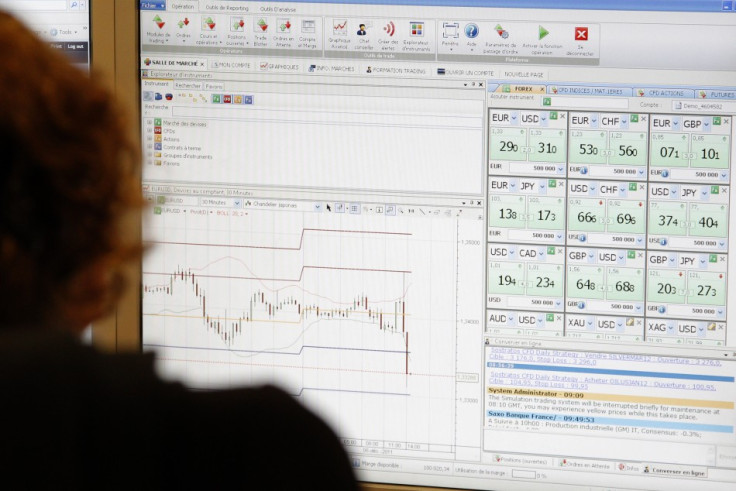European Markets Steady Amid Mixed Government Bond Sales

European shares are holding onto modest gain Tuesday after a hectic session in the fixed income markets where investors took down nearly €7.5bn in new debt from Spain, Italy and the Netherlands.
The three sales passed without any great calamity from two of the region's cash-strapped economies - and a third which has just seen its government collapse - and allowed investors to focus more firmly on a busy morning for European corporate results.
The Netherlands kicked things off with an interesting €2bn offering of 2-year and 25-year year bonds, less than a day after Moody's Investors Service said the resignation of the country's government may hurt the outlook on its triple-A credit rating. Prime Minister Mark Rutte dissolved his cabinet after failing to agree terms with his coalition partners and government opposition on terms that would trim the country's budget deficit and cut public spending by around €9.5bn.
The Dutch government was able to secure a slight reduction in two-year borrowing costs, with yields falling to 0.523 percent, down from Monday's market rate of 0.664 percent. The longer bond sale, likely to be the last of the year, came in at an average yield of 2.782 percent, slightly higher than Monday's market rate.
The so-called spread, or the extra yield investors demand to hold Dutch government bonds instead of German bunds, narrowed to 66 basis points in Tuesday trading from a three-year high of 78 basis points Monday. A basis point is 0.01 percent.
The relatively strong results boosted broader market sentinment, helping to lift major indicies around the region into modest gains for the morning session. The broadest measure of blue-chip share performance, the FTSE Eurofirst 300, rose 6.4 points, or 0.6 percent, to trade at 1,027.81. Gains were also made on the benchmark FTSE 100, where the index rose 33 points, or 0.6 percent, by late Tuesday afternoon to trade at 5.696.65. In Germany, the DAX edged up nearly 0.9 percent in an effort to reverse Tuesday's 3.4 percent slump linked to disappointing manufacturing data from Europe's largest economy.
In Spain, the country's planned €2.5bn sale of 3-month and 6-month treasury bill was complicated by figures from the Bank of Spain Monday which confirmed the region's fourth-largest economy's return to recession in the first quarter of this year. Borrowing costs rose for both sales rose significantly from similar auctions last month, although demand did increase for the €1bn offering of 3-month bills with bidders placing orders of €7.6 for every €1 for sale, owing to a reduced amount of bills for sale. (both auctions raised €2bn). Market rates on Spain's 10-year benchmark bonds edged past 6 percent in trading following the results.
Perhaps the most troubling of the day's auctions, however, were in Italy, where the country's Treasury added €3.4bn onto the world's second-largest bond market outside of the United States, in sales of 2-year, 3-year and 7-year debt. Borrowing costs rose across the board, most notably in a €2.5bn sale of two-year "zero-coupon" bonds priced to yield 3.355 percent. The last sale of similar securities, on 27 March, cost the Italian taxpayer only 2.352 percent.
Italy's' 10-year bonds also weakened after the results, with the spread between German bunds hitting 407 basis points. Investors have increasingly added to Italy's borrowing costs since Prime Minister Mario Monti said his government was unlikely to meet its own deficit reduction targets by 2014 last week. The push-back comes only a month after a similar admission by Spain's Prime Minister Mariano Rajoy.
Investor scepticism was deepend by news from Greece today that predicted the troubled economy will contract by a sharper-than-expected 5 percent this year. The figure extends the country's recession to at least a fifth consecutive year and overrides a previous 4.5 percent contraction forecast that was made by the Bank of Greece only last month. The central bank also said its deficit reduction efforts would miss the March estimate by 0.5 percent and that it now expects a budget deficit figure of 7 percent by the end of the year.
Elsewhere, Britain's Debt Management Office was also active in the market Tuesday, raising £4.75bn in a 40-year Gilt sale priced to yield 3.446 percent. The bonds were sold via syndication, as opposed to auction, meaning the DMO worked closely with a select group of banks in assessing demand for the Gilts before agreeing to a price and volume of bonds for sale. The process comes on the same day the UK's Office for National Statistics said the government had hit its deficit reduction target for the 2011/2012 financial year. The Public Sector Net Borrowing figure, preferred by the ONS, fell to 8.3 percent of GDP from 9.27 percent in the previous year. The total borrowing tab hit the government's target of £126bn.
© Copyright IBTimes 2025. All rights reserved.





















